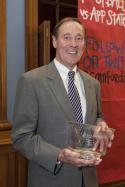Published on July 31, 2015
 "Then we began hearing gunshots coming in from the west and all these hundreds of thousands of people began running..."
"Then we began hearing gunshots coming in from the west and all these hundreds of thousands of people began running..."
Chapters
Background and Travels
Jim Huskey talks about his time at Samford University and travels in Europe and Asia.
US Diplomat in China: Human Rights Officer and the Tienanmen Massacre
Jim Huskey discusses his time as a US diplomat in China, and witnessing the Tienanmen Massacre.
US Diplomat in India: Promoting Economic Development
Huskey talks about his time as a diplomat in India, and his role in promoting economic development and trade.
US Diplomat in Kenya: Democracy Building
Jim Huskey discusses the role he played in building democracy while serving as a diplomat in Kenya.
US Political Counselor in Taiwan: Conflict Prevention
Huskey talks about his time as the Political Counselor at the American Institute in Taiwan and conflict prevention.
Working as a team and Unofficial Diplomats
Huskey introduces his wife, Joanne, and discusses the many roles played by "unofficial diplomats".
The Role of the Unofficial Diplomat
Joanne Huskey discusses her role as an "unofficial diplomat".
Asia and Foreign Policy
Jim Huskey discusses Asia, particularly China, India and Japan.
US Liaison to ASEAN
Jim Huskey talks about his time as the State Department Liaison to the Association for Southeast Asian Nations, the problems with ASEAN and his role in US foreign policy in Asia.
US Diplomat in China after Tienanmen
Jim and Joanne Huskey talk about their time in China leading up to and after the Tienanmen Square Massacre and US relations with China during that time.
US relations in other areas after Tienanmen
Jim and Joanne Huskey discuss the impact US-Chinese relations had on other areas of Southeast Asia, specifically Hong Kong and Taiwan.
Effect of the Tienanmen protests on the rest of the Communist World
The Huskeys talk about how the coverage of the Tienanmen protests affected the collapse of the Communist nations.
Witnesses to the Tienanmen Square Massacre
The Huskeys discuss the causes of the Massacre, who started it, and the aftermath.
How to Join the US Foreign Service
The Huskeys explain several of the different methods for getting into the US Foreign Service, such as the Peace Corps, as well as some of the types of people who join, and the requirements to join.
The Chinese Government's Reaction to the Tienanmen Protests, and its Impact Today.
The Huskeys discuss the reactions of the Chinese government to Tienanmen, and how the Massacre is seen in China today.
US Diplomat: America's Response to Tienanmen
Jim Huskey explains why the American government responded to Tienanmen the way it did.
Post-Communist China
The Huskey's talk about the changing government policy of China, the declining influence of Communism, and the future of that nation.
Reform Groups in China
The Huskeys discuss the possible groups pushing for reform in China, specifically the role that environmental groups play. They also discuss specific environmental problems facing China, and the government's role in keeping reform groups under control.
Closing Remarks
Jim and Joanne Huskey make their closing remarks in the lecture on the nature of human rights in China, building for the future, and final questions.
Transcript
| Attribute | Value |
|---|---|
| Interviewer | Jim Brown |
| Interviewee | Jim Huskey |
| Repository | Samford University Oral History Collection |
| Collection | STORI Collection |
| Accession | SUHist/NationalService/001 |
